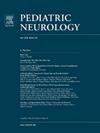Epilepsy and Developmental Delay in Pediatric Patients With PTEN Variants and a Literature Review
IF 3.2
3区 医学
Q2 CLINICAL NEUROLOGY
引用次数: 0
Abstract
Background
Epilepsy is not common in pediatric patients with phosphatase and tensin homolog (PTEN) variants. The characteristics of epilepsy, reactions to antiseizure medications, and prognosis in these patients are not fully understood. The aim of this study was to elucidate the characteristics of epilepsy and developmental outcomes in pediatric patients with PTEN variants.
Methods
We collected data from pediatric patients followed in Peking University People’s Hospital from July 2018 to April 2024.
Results
Thirteen children harboring PTEN variants were identified (mean age, 4.1 years). All the children (100%) with PTEN variants exhibited macrocephaly, 92.3% (12 of 13) had developmental delays, and 38.5% (five of 13) were diagnosed with autism spectrum disorder. Among the 13 children, 15.4% (two of 13) had epilepsy, and both responded well to antiseizure medications. Furthermore, we reviewed published articles on PTEN variants and epilepsy. We found seven studies of 665 pediatric patients with PTEN variants, including 26 patients with epilepsy. Among the 26 epileptic patients, information about the number and response to antiseizure medications was available for only 14 patients, and 15 patients had information about seizure types. Focal seizures were the most common seizure type (10 of 15, 66.7%). Only 28.6% (four of 14) of patients were diagnosed with drug-resistant epilepsy, and all patients (four of four) had abnormal brain magnetic resonance imaging findings.
Conclusions
In summary, a high proportion of pediatric patients with PTEN variants have developmental delay. Among epileptic patients, the most common seizure type is focal seizures, and these patients are more likely to respond to antiseizure medications if their brain imaging results are normal. Further large-scale studies are necessary to characterize the clinical characteristics of pediatric patients with epilepsy harboring PTEN variants and establish standard treatments.
小儿PTEN变异患者的癫痫和发育迟缓及文献综述。
背景:癫痫在磷酸酶和紧张素同源物(PTEN)变异的儿童患者中并不常见。这些患者的癫痫特征、对抗癫痫药物的反应和预后尚不完全清楚。本研究的目的是阐明小儿PTEN变异患者的癫痫特征和发育结局。方法:收集2018年7月至2024年4月在北京大学人民医院随访的儿科患者的数据。结果:发现13例携带PTEN变异的儿童(平均年龄4.1岁)。所有携带PTEN变异的儿童(100%)表现为大头畸形,92.3%(12 / 13)有发育迟缓,38.5%(5 / 13)被诊断为自闭症谱系障碍。在13名儿童中,15.4%(2 / 13)患有癫痫,并且对抗癫痫药物反应良好。此外,我们回顾了已发表的关于PTEN变异与癫痫的文章。我们发现了7项研究,涉及665名PTEN变异的儿童患者,其中包括26名癫痫患者。在26例癫痫患者中,只有14例患者有抗癫痫药物数量和反应的信息,15例患者有癫痫发作类型的信息。局灶性发作是最常见的发作类型(15例中有10例,占66.7%)。仅28.6%(4 / 14)的患者被诊断为耐药癫痫,且所有患者(4 / 4)均有异常的脑磁共振成像表现。结论:综上所述,PTEN变异的儿童患者中有很高比例存在发育迟缓。在癫痫患者中,最常见的发作类型是局灶性发作,如果他们的脑成像结果正常,这些患者更有可能对抗癫痫药物有反应。需要进一步的大规模研究来确定PTEN变异儿童癫痫患者的临床特征并建立标准治疗方法。
本文章由计算机程序翻译,如有差异,请以英文原文为准。
求助全文
约1分钟内获得全文
求助全文
来源期刊

Pediatric neurology
医学-临床神经学
CiteScore
4.80
自引率
2.60%
发文量
176
审稿时长
78 days
期刊介绍:
Pediatric Neurology publishes timely peer-reviewed clinical and research articles covering all aspects of the developing nervous system.
Pediatric Neurology features up-to-the-minute publication of the latest advances in the diagnosis, management, and treatment of pediatric neurologic disorders. The journal''s editor, E. Steve Roach, in conjunction with the team of Associate Editors, heads an internationally recognized editorial board, ensuring the most authoritative and extensive coverage of the field. Among the topics covered are: epilepsy, mitochondrial diseases, congenital malformations, chromosomopathies, peripheral neuropathies, perinatal and childhood stroke, cerebral palsy, as well as other diseases affecting the developing nervous system.
 求助内容:
求助内容: 应助结果提醒方式:
应助结果提醒方式:


